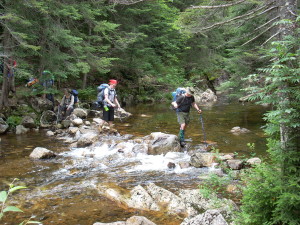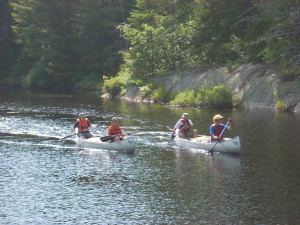The movie “White Mile” (trailer found here) (available on DVD and used in support of some university outdoor recreation courses) is based on a true life event where several adult participants perished during a “corporate-bonding” white water rafting event in Canada.
The point is made in the movie that some participants may have felt pressured to participate on the trip, organized by their corporate boss, despite the perceived (and actual) challenging conditions of the river, which conditions were apparently beyond the skill level and physical ability of some participants (those who perished).

Indeed, as stated during the movie by an actor portraying a trip survivor, “When people’s lives are at stake, I think people are entitled to decide for themselves how much risk they will be exposed to.” The movie is indeed instructive on this point and worth a viewing.
Other stories on the web suggest that adult volunteers, as in this story, this story, and this story, may at times for any number of reasons, place themselves at undue risk, or risk beyond their level of preparation or skill, during outdoor events involving a group of which they are a member, resulting in a tragic outcome.
Were those adults given sufficient notice such that they had the opportunity to fully consider whether they wished to assume the risk of their participation or, given the circumstances of the activity (scheduling, need for adult participation, etc.), did they feel pressured or compelled to participate despite any misgivings they may have had regarding their personal safety based on any lack of skill or preparedness they may have for the activity?
Remember, adult participants are the only participants who can legally assume the risk of the activity, but they need to be given the opportunity to do so, with sufficient notice of the activity and its requirements, particularly if the degree of physical exertion and skill level required is above and beyond that which might normally be encountered in their everyday lives.
Something to think about, as the welfare of well-meaning, unselfish, adult volunteers (presumably all with families) should be taken into account in addition to that of the Scouts.
Indeed, since 2005, it has been publicly reported that at least six adult leaders have perished during Scouting-sponsored white water rafting trips, not to mention an additional two reported deaths while on canoeing trips. (The author cannot verify if these reported deaths are the only ones, as there may be, and probably are others, that were not publicly reported).
Other adult volunteers have reportedly perished as a result of excessive heat during a hike, seizures, heart attacks while swimming and hiking, and driving incidents, among other causes.

See, for example, this 2015 story, where an experienced adult leader perished due to a heart attack while hiking in New Hampshire with his troop. Similar hiking tragedies occurred in 2016 in New Hampshire, and in 2017 in California.
In 2016 alone, at least 6 adult leaders tragically died during Scouting activities: one adult leader perished as a result of a fallen tree at Northern Tier, one drowned while white water rafting, one suffered a heart attack while hiking with his troop in New Hampshire, one drowned while canoeing, one perished in a vehicular accident during a Scouting activity, and another died of a heart attack during a summer camp swim test. There may have been more.
Here are two stories about adult leaders surviving heart attacks while sailing, one in 2016, and one in 2017.
The pressure of conducting an activity should not operate to prevent a potential adult participant from determining whether he or she is comfortable with placing themselves in possible harm due to (1) the environment within which the activity is to be conducted, and (2) the skill level and fitness level of the adult in relation to the technical skills and fitness level required by the activity.

For example, for a troop intending to participate in a canoe trek at Northern Tier, where a number of adult volunteers will participate as adult advisors, is sufficient thought given to ensuring that those adults understand the potential physical challenges, risks and hazards to be encountered, on and off the water, so that they may become adequately prepared for the potential challenges of the trek? (It goes without saying that such a thought process is also necessary for a successful and safe adult Philmont experience)
Unfortunately, many well-meaning, unselfish adults place themselves in positions of potential harm in an attempt to assist with an outdoor program activity for youth while lacking the experience, physical conditioning, or skill level that may be required, and possibly lacking adequate knowledge of what may be required of them to do so.
This would be a good conversation to have prior to planning and conducting the activity. Their family would be appreciative!
